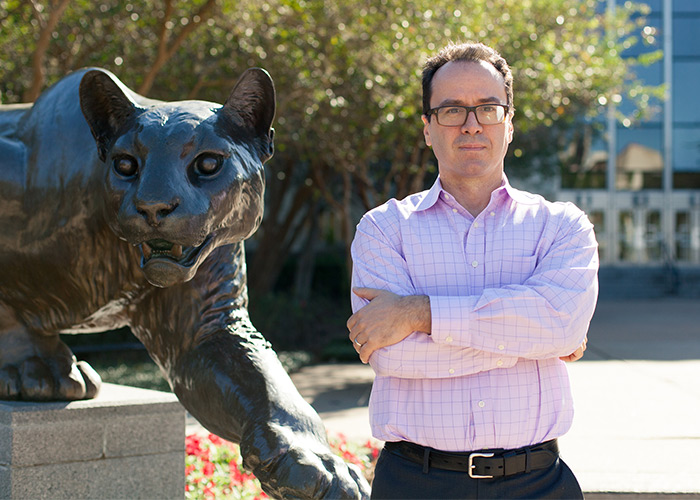National Institute of Mental Health Funds Decision-Making Research
In an uncertain world, how do people make decisions for the future?
 Krešimir Josić, professor of mathematics at the University of Houston, will conduct
research to see if people adjust their decision-making strategies to account for a
changing environment.In a new grant from the National Institute of Mental Health, Krešimir Josić, professor
of mathematics at the University of Houston, along with collaborators from the University
of Pennsylvania and the University of Colorado Boulder, will conduct controlled experiments
to see if people adjust their decision-making strategies to account for a changing
environment.
Krešimir Josić, professor of mathematics at the University of Houston, will conduct
research to see if people adjust their decision-making strategies to account for a
changing environment.In a new grant from the National Institute of Mental Health, Krešimir Josić, professor
of mathematics at the University of Houston, along with collaborators from the University
of Pennsylvania and the University of Colorado Boulder, will conduct controlled experiments
to see if people adjust their decision-making strategies to account for a changing
environment.
Variability of Environment Important For Decision-Making
One example of this type of decision would be moving into a specific neighborhood. Most people make this decision by talking to people who have lived there, while also researching factors such as home prices, school quality and crime rates.
However, depending on the current state of the neighborhood, some of the older information may not be relevant.
“When making decisions, we frequently have to take into account the variability in the environment,” Josić said. “How quickly is the environment changing?”
Perhaps a once-high crime rate is dropping due to increased law enforcement, or perhaps school quality is declining because families are moving out, or perhaps the historic prices don’t reflect a current economic boom that will cause home values to soar.
Rate of Change Affects Information Relevance
Part of what makes information relevant is the rate at which the environment, such as a specific neighborhood, is changing. If a neighborhood remains stable, then this older information is a good indicator. If not, then some of this information may no longer be applicable.
“We want to see if people discount older information as less relevant,” Josić said. “How much weight do people give to this older information?”
Josić’s research group will be developing mathematical algorithms that describe optimal and near optimal strategies for decision-making in variable environments.
Optimal Guessing Strategies: How Close Do People Get?
“Mathematically, we can devise an algorithm that creates a strategy that will give you the highest percentage of being right,” Josić said. “The question is, how close do people get?”
Meanwhile, collaborators at the University of Pennsylvania will take this into the lab, testing decision-making in a controlled environment, to see how decisions differ from the optimal strategy, as well as probe the neural circuits that are involved.
“Variability in the environment is a hidden aspect, but one that is still important for decision-making,” Josić said.
This grant, which is for a four-year duration, is in collaboration with University of Pennsylvania faculty member Joshua Gold and University of Colorado Boulder faculty member Zachary Kilpatrick. Of the total grant amount, Josić’s group has been awarded $409,038.
- Rachel Fairbank, College of Natural Sciences and Mathematics